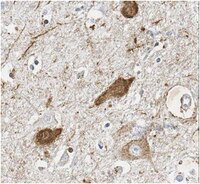Molecular reorganization of endocannabinoid signalling in Alzheimer's disease.
Mulder, Jan, et al.
Brain, 134: 1041-60 (2011)
2010
Afficher le résumé
Retrograde messengers adjust the precise timing of neurotransmitter release from the presynapse, thus modulating synaptic efficacy and neuronal activity. 2-Arachidonoyl glycerol, an endocannabinoid, is one such messenger produced in the postsynapse that inhibits neurotransmitter release upon activating presynaptic CB(1) cannabinoid receptors. Cognitive decline in Alzheimer's disease is due to synaptic failure in hippocampal neuronal networks. We hypothesized that errant retrograde 2-arachidonoyl glycerol signalling impairs synaptic neurotransmission in Alzheimer's disease. Comparative protein profiling and quantitative morphometry showed that overall CB(1) cannabinoid receptor protein levels in the hippocampi of patients with Alzheimer's disease remain unchanged relative to age-matched controls, and CB(1) cannabinoid receptor-positive presynapses engulf amyloid-β-containing senile plaques. Hippocampal protein concentrations for the sn-1-diacylglycerol lipase α and β isoforms, synthesizing 2-arachidonoyl glycerol, significantly increased in definite Alzheimer's (Braak stage VI), with ectopic sn-1-diacylglycerol lipase β expression found in microglia accumulating near senile plaques and apposing CB(1) cannabinoid receptor-positive presynapses. We found that microglia, expressing two 2-arachidonoyl glycerol-degrading enzymes, serine hydrolase α/β-hydrolase domain-containing 6 and monoacylglycerol lipase, begin to surround senile plaques in probable Alzheimer's disease (Braak stage III). However, Alzheimer's pathology differentially impacts serine hydrolase α/β-hydrolase domain-containing 6 and monoacylglycerol lipase in hippocampal neurons: serine hydrolase α/β-hydrolase domain-containing 6 expression ceases in neurofibrillary tangle-bearing pyramidal cells. In contrast, pyramidal cells containing hyperphosphorylated tau retain monoacylglycerol lipase expression, although at levels significantly lower than in neurons lacking neurofibrillary pathology. Here, monoacylglycerol lipase accumulates in CB(1) cannabinoid receptor-positive presynapses. Subcellular fractionation revealed impaired monoacylglycerol lipase recruitment to biological membranes in post-mortem Alzheimer's tissues, suggesting that disease progression slows the termination of 2-arachidonoyl glycerol signalling. We have experimentally confirmed that altered 2-arachidonoyl glycerol signalling could contribute to synapse silencing in Alzheimer's disease by demonstrating significantly prolonged depolarization-induced suppression of inhibition when superfusing mouse hippocampi with amyloid-β. We propose that the temporal dynamics and cellular specificity of molecular rearrangements impairing 2-arachidonoyl glycerol availability and actions may differ from those of anandamide. Thus, enhanced endocannabinoid signalling, particularly around senile plaques, can exacerbate synaptic failure in Alzheimer's disease. | 21459826
 |














